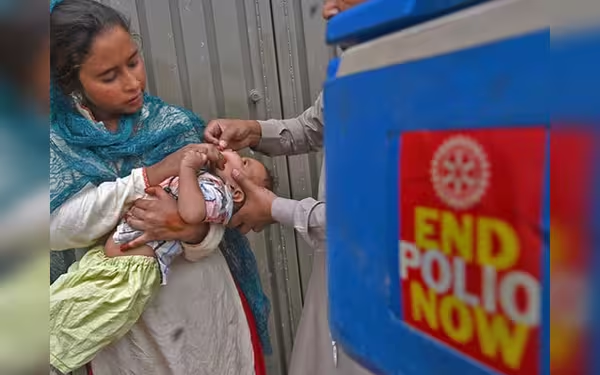Tuesday, July 2, 2024 03:31 PM
NIH Islamabad Confirms Presence of Poliovirus in Pakistan
- Detection of Type-1 Wild Poliovirus in multiple districts in Pakistan
- Importance of vaccination campaigns in preventing poliovirus spread
- Need for continued vigilance and proactive measures to eradicate poliovirus
 Image Credits: The Express Tribune
Image Credits: The Express TribuneThe National Institute of Health in Islamabad confirms the presence of Type-1 Wild Poliovirus in environmental samples from various districts in Pakistan, highlighting the importance of vaccination campaigns and ongoing surveillance to prevent the spread of the virus.
The National Institute of Health (NIH) Islamabad has confirmed the presence of Type-1 Wild Poliovirus (WPV1) in environmental samples collected from various districts in Pakistan. The detection of the poliovirus in these samples raises concerns about the potential spread of the disease in the affected areas.
The districts where the poliovirus was found in environmental samples include Hyderabad, Keamari, Karachi, Jamshoro, Sukkur, Jacobabad, MirpurKhas, Chaman, Quetta, and Nasirabad. In Karachi West, the first positive sample was collected from the 'Khamiso Goth' environmental sample collection site, highlighting the presence of the virus in the district. Similarly, in Mirpur Khas, the first positive sample was collected from the 'Ring Road Puraan' site, indicating a new area of concern for poliovirus transmission.
Poliovirus is a highly contagious virus that can cause paralysis and, in severe cases, can be fatal. Vaccination campaigns are crucial in preventing the spread of the virus and protecting communities from outbreaks. The detection of WPV1 in environmental samples underscores the importance of ongoing surveillance and vaccination efforts to eradicate poliovirus from Pakistan.
The confirmation of Type-1 Wild Poliovirus in environmental samples from multiple districts in Pakistan highlights the need for continued vigilance and proactive measures to prevent the spread of the virus. Public health authorities must intensify vaccination campaigns and surveillance activities to safeguard communities against the threat of poliovirus transmission.













